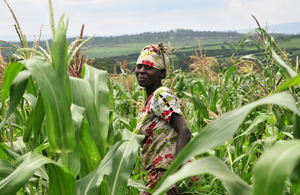DFID Research: Improving maize crop yields in Rwanda's Eastern province
The Maize Platform is one of four innovation platforms which the Research into Use programme has established in Rwanda to help increase production

Farmer in maize field in Nyagatare, Rwanda's Eastern Province. Picture: Neil Palmer (CIAT)
Maize is an important staple crop in Rwanda with the potential for export if production can be significantly increased. The DFID-funded Research into Use (RIU) Programme is working with a network of local partners to achieve that aim through a Maize Innovation Platform in Rwanda’s Eastern Province.
Gahne Jringhica farms one hectare of land sown with maize in the Nagartare district of Rwanda’s Eastern province. Like 83% of Rwanda’s working population he lives in a rural area and survives on subsistence agriculture. This year, thanks to improved yields of maize, he has for the first time been able to send his children to school, erect a semi-permanent dwelling and purchase a cow.
Mr Jringha is amongst a group of farmers in the district who have seen improvements in their livelihoods. These have been made possible by access to new seed varieties, improved access to market and training in different planting methods through a cooperative set up by the RIU’s Rwanda country team as part of its innovation ‘platform’ work.
How the innovation platforms came into being
The Maize Platform was created in June 2008. It was one of four identified by the National Innovation Coalition which the RIU programme established in Rwanda as a vehicle for strengthening an innovation approach to agriculture. The innovation platforms bring together a network of partners who “work together on a common theme to use research knowledge in ways it has not been used before, to generate goods or services for the benefit of the poor.”
Connecting everyone in the agricultural value chain in the district from the processors to the buyers, the transporters and knowledge producers is a one of the main aims of the platform’s members. Butera Rembo is the Maize Platform Chairman and the farmer responsible for training Mr. Jringhica in new farming techniques. He farms 40 hectares in a remote area in the Nagartare district. Explaining the typical problems and challenges the farmers in his area face and the Maize Platform must work to overcome he said: “There are three major problems faced by farmers in this sector. Firstly there is a lack of good quality seed, secondly fertilizer is very expensive and farmers do not really know how to apply it correctly. Thirdly there is climatic change. This place is prone to severe drought which destroys their crops.”
“After I was trained by RIU and other organisations such as the Rwandan Development Organisation in how to apply fertiliser and other best agricultural practices like planting in lines, I came here and started to train other local farmers in small workshops.”
New technologies made available to farmers
Besides the introduction of new seed varieties which grow much quicker (90 days compared to 150) in districts like Nagartare which has short rainy seasons, the Platform has also introduced other technologies, and is working on a system for sharing and transmitting new knowledge and improving access to finance. The Rwandan Development Organization, for example, targeted the introduction of oxen to women’s groups for the cultivation of their fields. This technology has proved very popular mainly because it has greatly reduced farm chores and significantly increased their household incomes as a local farmer Moomba Jane explains.
“Before the introduction of oxen we used to use hand hoes which would take a long time and we couldn’t cover a large area. We used to cultivate one hectare but now we can cultivate three hectares in one month,” she said. “I can also earn extra more money by ploughing other farmers’ fields with my oxen. The oxen also use a bigger hoe which allows us to dig deeper into the soil which is good. We also use them for bringing water home and oxen can carry 100 jerry cans compared to only one jerry can per person. We only used to harvest three tonnes of maize but now with the oxen we can harvest 30 to 50 tonnes of maize.”
Another platform member involved in issuing finance loans is the Duterimbere Women’s Organisation. The Duterimbere branch manager Rutabayriu Appolinaire describes how their initiative works: “Traditionally women are good managers compared to men who just get the money from farming and start drinking it. When women come here first of all they must belong to a group who provide a collective guarantee so that the women can be given loans. After benefiting from the group the women can set up their own farm and then deal with us directly and pay back the loan herself without the help of the group.”
Mr. Kabagame Chairman of National Innovation Coalition sums up his hopes for the results of the Platform’s work: “In the next three years we are expecting a lot of change. First we’ll produce a lot more quantity of produce. Second we want to improve the quality of products and all agricultural infrastructures in terms of transportation, storage and processing. We expect to see an increase in product, price, product selling and packaging in the market initially.”